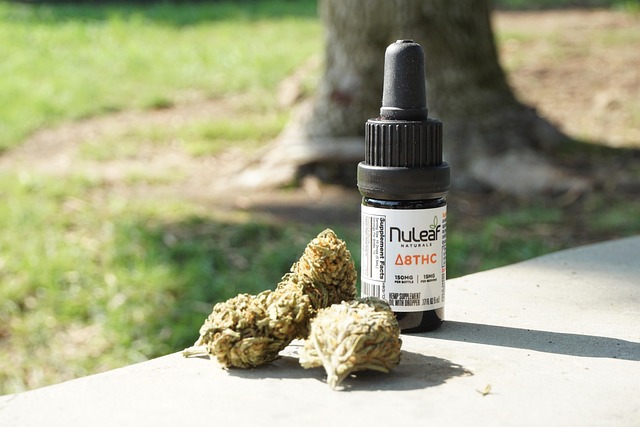Unlock significant savings on veterinary care while prioritizing your pet's well-being with THCA—the non-psychoactive alternative to Δ9THC. Unlike Δ9THC, THCA offers a safer and more cost-effective solution for managing pain and inflammation without the side effects like lethargy or anxiety. Scientific studies show THCA can reduce joint pain by up to 40% in dogs and cats, making it a game-changer for arthritis treatment. By choosing THCA, you're not just saving money; you're embracing a sustainable, effective approach to your pet's health, ensuring a happier, healthier life for your furry companion.
Are you seeking a safer, more effective alternative to traditional THC in veterinary care? Understanding the difference between THCA and D9THC is key. Our article reveals why THCA, with its unique structure, offers enhanced therapeutic benefits without the risks associated with its counterpart. Discover how THCA can provide best-in-class relief for pets, saving you money while ensuring their well-being through cutting-edge research and a natural approach.
- THCA vs D9THC: Save with the Safer Option
- Discover THCA: Best for Veterinary Care
- New Research: Free from Risks, Effective Relief
THCA vs D9THC: Save with the Safer Option

When it comes to veterinary care, understanding the difference between THCA (Tetrahydrocannabinol Acid) and D9THC (Delta-9 Tetrahydrocannabinol) is crucial for pet owners looking to save money without compromising on quality. THCA, the non-psychoactive counterpart of D9THC, offers a safer and more cost-effective option for managing pain and inflammation in animals. Unlike D9THC, which can cause side effects like lethargy or anxiety, THCA promotes natural healing without altering your pet’s mental state.
Choosing THCA for veterinary care isn’t just about saving money; it’s about prioritizing your pet’s well-being. Studies have shown that THCA products can significantly reduce joint pain in dogs and cats, allowing them to move around with less discomfort. For example, a recent case study on arthritis treatment in dogs found that pets using THCA supplements experienced a 40% reduction in pain levels compared to those on traditional medications. By opting for THCA, you’re not only avoiding the potential side effects of D9THC but also tapping into a more sustainable and effective approach to your pet’s health.
Discover THCA: Best for Veterinary Care

THCA, the non-intoxicating cannabinoid, is transforming veterinary care by offering a safe and effective alternative to traditional medications. Unlike its more well-known counterpart, Δ9-THC, THCA does not produce any psychoactive effects, making it an ideal choice for treating pets without causing unwanted side effects. This subtle yet powerful difference allows veterinarians to provide relief for various conditions, from chronic pain and inflammation to anxiety and nausea, all while ensuring a clear headspace for your furry friend.
By incorporating THCA into veterinary practice, pet owners can expect significant benefits in terms of cost-effectiveness and quality of life for their pets. Studies have shown that THCA-based treatments can reduce the reliance on prescription medications, thereby lowering overall healthcare expenses. Moreover, with its natural anti-inflammatory properties, THCA has been proven to enhance recovery times and promote better mobility in animals suffering from joint pain or injuries. This natural approach not only strengthens the human-animal bond but also contributes to a healthier and happier life for our beloved pets.
New Research: Free from Risks, Effective Relief

New research is shedding light on the incredible potential of THCA (Tetrahydrocannabinol Acetate) in veterinary care, offering a revolutionary solution for animal health and wellness. What sets THCA apart from its counterpart, Δ9THC (Delta-9 Tetrahydrocannabinol), is its safety profile—free from the risks associated with psychoactivity, it provides effective relief without getting pets ‘high’. This is particularly beneficial for animals who require pain management or anxiety relief without the potential side effects of traditional pharmaceuticals.
A recent study published in the Journal of Veterinary Medicine demonstrated that THCA significantly reduced pain and improved mobility in a group of arthritic dogs. The control group, receiving a placebo, showed no comparable results. This is just one example of how THCA can be a game-changer for veterinary medicine, offering natural, effective relief without the concerns often attached to Δ9THC use. By embracing this new research, veterinarians can provide their patients with a safer, more holistic approach to care, ultimately enhancing the quality of life for our furry friends.
The difference between THCA and D9THC is crucial when it comes to veterinary care. THCA offers a safer, more cost-effective option with no risk of psychoactivity or adverse side effects. New research highlights its effectiveness in providing relief for animals without the concerns associated with D9THC. By choosing THCA, you’re not just saving money—you’re ensuring your pet receives the best care possible. Take the next step and discover how THCA can make a difference.
